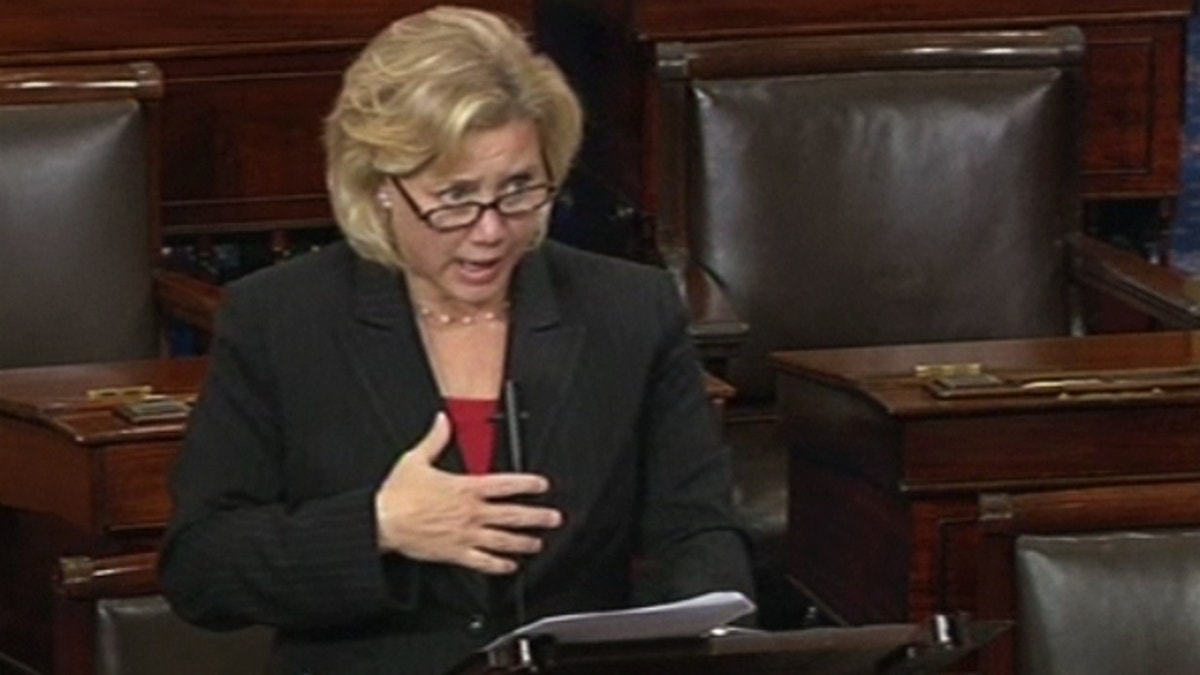
Sen. Mary Landrieu announces she'll support voting to begin debate on the Senate health care bill Nov, 21, 2009. (FNC)
WASHINGTON -- Sweeping health care legislation cleared its first hurdle Saturday in the Senate on a party-line vote, paving the way for debate on a massive health insurance overhaul.
The 60-39 vote opens the door for debate on the $848 billion legislation to start after Thanksgiving. The measure is designed to extend coverage over six years to an estimated 31 million Americans who lack it and crack down on insurance industry practices that deny benefits.
The White House released a statement saying, "The president is gratified that the Senate has acted to begin consideration of health insurance reform legislation. Tonight's historic vote brings us one step closer to ending insurance company abuses, reining in spiraling health care costs, providing stability and security to those with health insurance and extending quality health coverage to those who lack it. The president looks forward to a thorough and productive debate."
The rare Saturday session amounted to a first round in the fight to pass the bill in the full Senate, where Democratic holdouts announced they would support at least the measure to open debate on the bill, avoiding an early knockout by Republicans.
Sens. Blanche Lincoln of Arkansas and Mary Landrieu of Louisiana waited until Saturday to say they would vote yes for a floor debate. Sen. Ben Nelson of Nebraska announced Friday his support for moving the bill forward.
All three cautioned that their votes to start debate should not be construed a support for the bill in its current form.
"It is a vote to move forward to continue the good and essential and important and imperative work that is under way," said Landrieu,who scored $100 million in additional funding for her state's health care services for low-income residents. "I've decided that there's enough significant reforms and safeguards in this bill to move forward but more work needs to be done."
Lincoln, who faces a tough re-election next year, said she still would support a filibuster if the so-called "public option," a government-run insurance plan, remains in the health care bill.
"I along with others expect to have legitimate opportunities to influence the health care reform legislation that is voted on by the Senate later this year or early next year," she said.
While the vote is only a procedural one, Republicans haven't backed down.
"This is a vote about whether or not you want to fundamentally change the way health care is delivered in this country in a way which massively expands the size of government, the role of government and significantly increases the tax burden, especially for small businesses, and cuts Medicare by a dramatic amount of money," Sen. Judd Gregg, R-N.H., told Fox News before Saturday's session began.
Senate Minority Leader Mitch McConnell called the bill "monstrous" and, citing the Congressional Budget Office, said it would not bring down costs.
Democrats said their legislation could make historic and necessary improvements in the country's social safety net.
"Prices of health care are marching relentlessly upwards, and so too many people don't have coverage," said Sen. Byron Dorgan, D-N.D. "The purpose of all of this is to try to get a handle on it somehow."
Most Americans would be required to purchase insurance under Reid's legislation, and billions in new taxes would be levied on insurers and high-income Americans to help extend coverage to 31 million uninsured. Insurance companies would no longer be allowed to deny coverage to people with medical conditions or drop coverage when someone gets sick.
Republicans used their weekly radio and Internet address to slam the legislation, calling it a government takeover of health care that would increase taxes and raise medical costs.
"This 2,000-page bill will drive up the cost of health care insurance and medical care, not down," Sen. Mike Crapo, R-Idaho, said in the address. "This is not true health care reform, and it is not what the American people want. This bill will result in higher premiums and higher health care costs for Americans -- period."
The action in the Senate comes two weeks after the House approved a health overhaul bill of its own on a 220-215 vote. After the vote Saturday night, senators will leave for a Thanksgiving recess. Upon their return, they will launch into weeks or more of unpredictable debate on the health care bill, with numerous amendments expected from both sides of the aisle and more 60-vote hurdles along the way.
Senate leaders hope to pass their bill by the end of the year. If that happens, January would bring work to reconcile the House and Senate versions before a final package could land on President Obama's desk.
The bills have many similarities, including the new requirements on insurers and the creation of new purchasing marketplaces called exchanges where self-employed individuals and small businesses could go to shop for and compare coverage plans. One option in the exchanges would be a new government-offered plan, something that's opposed by private insurers and business groups.
Differences include requirements for employers. The House bill would require medium and large businesses to cover their employees, while the Senate bill would not require them to offer coverage but would make them pay a fee if the government ends up subsidizing employees' coverage.
Another difference is in how they're paid for. The Senate bill includes a tax on high-value insurance policies that's not part of the House bill, while the House would levy a new income tax on upper-income Americans that's not in the Senate measure. The Senate measure also raises the Medicare payroll tax on income above $200,000 annually for individuals and $250,000 for couples. Both bills rely on more than $400 billion in cuts to Medicare.
The Senate bill was written by Reid in private negotiations with White House officials, combining elements of two committee-passed bills and making additional changes with an eye to getting the necessary 60 votes.
Along the way, Reid sweetened the pot for individual senators, adding federal funds for Louisiana and agreeing to support an amendment written by Sen. Ron Wyden, D-Ore., that would expand eligibility for the purchasing exchanges.
Fox News' Trish Turner, Carl Cameron and The Associated Press contributed to this report.




